#like with the allegory for trauma and survivor's guilt
Explore tagged Tumblr posts
Text
YES YES YES THE RITUAL
Fucking LOVE that movie holy shit
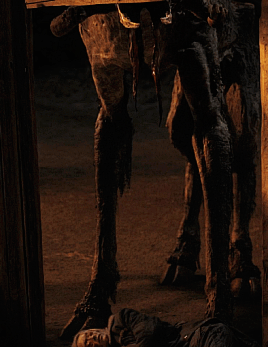
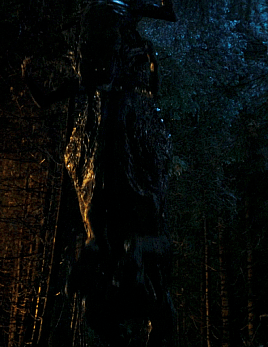
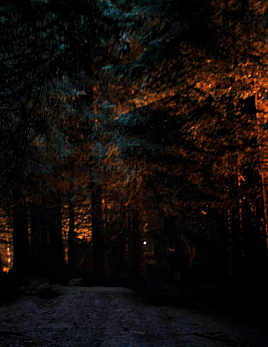
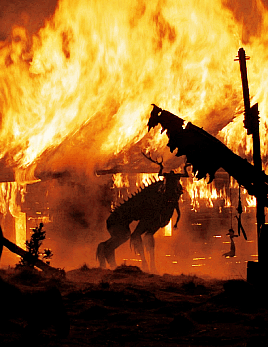
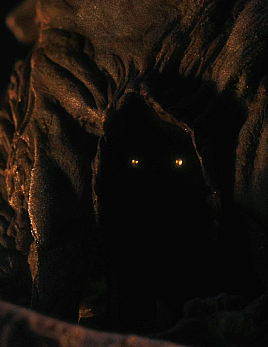
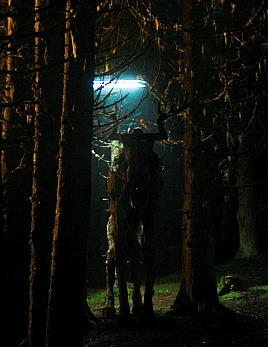
anonymous requested:
MODER in THE RITUAL 2017 | dir. David Bruckner
#love the book too#but i think the movie is a lot deeper and more complex#like with the allegory for trauma and survivor's guilt#this is for real the only book-to-movie adaptation i've seen where the movie was deeper and more complex and just better than the book#no hate to adam nevill#i absolutely love his work#but i'm such a sucker for trauma allegories and recovery
13K notes
·
View notes
Text
i watched "godzilla minus one", and it was pretty solid for my first time watching a godzilla movie!! beyond enjoying the action that effectively conveyed the sheer scale and impact of godzilla's movement and destruction, i found the themes engaging too. we see (non-blood) families form and repair their homes and heal, we see ex-navy try to disarm the destructive weapons they set, and we see koichi shikishima the ex-kamikaze pilot grapple with his ptsd and survivor's guilt.
the fact godzilla was predominantly an allegory for the trauma of war was an interesting take, though of course the trauma of nuclear warfare persists as a motif. but the theme that most stood out to me was the challenge to this cultural idea that dying for a cause is somehow noble rather than just dying.
when shikishima returns to (the rubble of) his home, he is immediately admonished by sumiko for deserting his duty to die and returning dishonorably. he then struggles with his cowardice over and over again, afraid of making emotional connections when he resists letting noriko into his life, rejects akiko calling him "dad", and - during a traumatic episode - even briefly denies the fact that he's alive at all. but when faced with the consequences of suppressing his trauma until it - godzilla - arrives larger and more destructive than before, he finally begins to open up. i particularly liked the sequence of shots during the scene where shikishima confesses the burdens he's been carrying to her. it transitions from individual shot/reverse-shots of the two, to sharing a frame, to finally being in focus together as they manage to connect for the first time.
in the process of fighting godzilla, shikishima realizes the "honorable" answer is not to die for vengeance, but to face your remorse head on while choosing to live. because in a way, choosing to die would still be running away from the struggle of accepting your past and fighting for a brighter future. rather than dying and evading the consequences thereafter (as the japanese government demanded), it is braver to embrace the inherent value of human life, including your own, and whatever comes with it.
even the fact that [spoilers] godzilla is defeated but not annihilated reflects the reality that trauma usually sticks around, able to flare up again; it's just that you learn how to carry it with you, especially with the support of the community and family around you.
i just really love that the story subverts the setup that shikishima should finish his internal war by sacrificing himself as he "should've" in the actual war. instead, through ingenuity and camaraderie, the real triumph is learning to honor the fallen not by mindlessly throwing away his life for those who perished, but by deliberately, collectively paving a future for those who survive.
all that said, i do find it possibly convenient that the story sidesteps the issue of what japan was actually fighting for in ww2 and the atrocities committed by the japanese empire. the movie does take care to distinguish between the japanese government and the private citizens who take up the fight against godzilla. it helps for sure, since it allows our cast to criticize the government's decisions. however, i can't help but wonder if that still makes the historical narrative seem a bit too clean, especially when the veterans claim this time they can make a difference, when uh... idk if helping japan actually win the war would've been the BEST...?? generously, that might not have been their exact intended meaning, but it does feel oddly framed lol. also how lucky is it that seemingly none of the veterans who volunteer are complicit in any of the countless war crimes committed by the japanese army lol
also the women in this film mostly exist in maternal or literal child roles to support the men's growth lol and it's a shame their stories don't get equal examination, but at least the emotional vulnerability still feels real and i called her surviving and we take those bc i woulda been EVEN MADDER OTHERWISE ok !!!!!
besides those issues, i would hardly say the film is difficult to predict - it's fairly straightforward and even the setup for its subversions is not too hard to catch. but i don't think that made it necessarily less compelling or the themes less resonant. it's hard not to appreciate how the movie wants you to see the value in life and believe in the future. because no matter what pain you may carry, you don't have to confront it alone.
#godzilla#godzilla minus one#godzilla analysis#movie analysis#my jessays#godzilla spoilers#godzilla minus one spoilers
45 notes
·
View notes
Text
while it’s important that rj understood how prolonged exposure to trauma would mess with you psychologically on various axes - mental, emotional, spiritual, physical - it’s also very significant that he put in the work to question and explore how people could go about healing and recovering from their experiences with a realistic attitude.
sometimes they don’t heal - they don’t understand that they need healing, dismiss their instincts, or manage to bury all the complicated emotions they’re feeling. it’s seen when mat suffers from a severe case of survivor’s guilt whenever he survives a battle, and this is observed more obviously when he escapes from ebou dar without managing to save all the windfinders; he also doesn’t have the vocabulary to express why the abuse he suffers at tylin’s hands feels wrong, and his cultural background and his tendency to lie to himself prevents him from examining why this is the case. rand is simply incapable of dealing with the sheer physical, mental and emotional stress he’s subjected to without a support system to back him up - support that he’s specifically unwilling to ask for because he doesn’t want to be put in a position of vulnerability just like mat and has a very unique relationship with the level of autonomy he’s afforded and the abuse he may be subjected to as a result of his madness - and resorts to unhealthy coping mechanisms and internalises traits that also serve as an allegory for ideologies that toxic masculinity directly feeds off of; he reacts to aes sedai very badly although he eventually unlearns that instinct; he’s extremely suicidal, and lews therin works as an indirect metaphor for depression. egwene feels the need to be in a position of power whenever approaching a certain relationship (be it romantic, platonic or otherwise) after her time as a damane, and is often uncomfortable with setting down her guard unless she trusts the people she’s working with; rj has a very complicated track with his depiction of corporal punishment but he also touches on how it enables people in power to take advantage of it to abuse the people under their control through egwene’s arc. rand specifically laments how the sort of stigma and alienation that male channelers face will never really go away because of the fear ingrained into popular belief, and that’s also a very accurate depiction of how certain mental illnesses are received by society.
but rj puts in the extra work to explore how people who have access to support systems and are on the receiving end of patience and compassion are able to get on the path to recovery. he has nynaeve & co deal with the problem of deprogramming egeanin, the sul’dam and damane who’re thoroughly brainwashed by the seanchan. juilin is able to help amathera recover by being very sympathetic to her situation and protecting her from difficult situations that could trigger her ptsd. rj specifically spends a significant amount of time letting joline, teslyn and edesina slowly encourage the seanchan channelers to entertain the idea of their ability not being a curse and to even train to control it at the white tower. the maidens are able to get a read on rand’s discomfort with the dark and small spaces post dumai’s wells and are kind enough to always leave a light on in the dark for him; they also push rand to take his meals and care for himself. the asha’man are explicitly recognised as a group which needs to unlearn some of the toxic ideas encoded in the founding principles that rand introduced. rand himself is recognised to be in dire need of help again in the latter half of the series, although we never got to see the culmination of that arc, unfortunately* - but I have a theory that his arc as a hero is tied very closely to his ability to recover from the various traumas he’s subjected to.
wheel of time takes a very realistic stance on mental health and ptsd. more significantly, it recognises that trauma might not necessarily bring about a positive transformation in a person. and that’s okay.
*cadsuane’s arrival is the only one I can’t get a clear read on, and feels so obviously doomed to disaster from the very beginning given how her personality clashes with rand’s and with her introduction with the intent of controlling rand and never respecting his opinions or autonomy - but given how she’s criticised by the narrative, I’m inclined to believe that min’s reading might have potentially been fulfilled in a bittersweet way as her readings often are. if rand learned how to embrace his humanity again, I can’t imagine that she would have ever had a part to play in it that involved compassion or understanding.
#he wasn't traumatising rand for the shits and giggles I would've loved to see where he would have gone with him though I have my own theory#I’ll save that for the super long rand post though… if I ever fucking finish it#text#HE least of all people would’ve kept pushing the trauma button without intent and just for the sake of Angst. unlike a lot of other authors#I have no idea what he was doing with perrin though lol it has to be said… he really is the weakest point in the series#I know people enjoyed dragonmount and sanderson’s take on how rand and egwene suffered trauma to eventually become Stronger#but that’s absolutely not a realistic depiction and it doesn’t work for me sorry to say.#I also Do Not Get dragonmount at all. it’s like if you pulled a rhetoric about love and living out of your ass when rand is suffering in#THIS life and THIS context… he walked in with some new character conflicts & adressed THEM instead of what rj had already written for rand.#wheel of time#wot book spoilers#rand al’thor
164 notes
·
View notes
Note
AIGHT. touken ranbu, my beloved game that I cannot play because it sucks (no really the gameplay is uhhh bad)
Basically the plot is: you are a [priest/shaman equivalent, i do not remember the word] who is able to... summon? the spirit/kami of a (any) sword. you're then given the mission to 1- summon a bunch of swords and 2- protect history from being altered by the mysterious evil group via time travel. im sure there's more to the story but that's the summary.
i said otome-but-not-really because this is about all that matters about the protagonist, there isn't even an official design afaik, or any lines.
anyway the swords are basically all traumatized, understandably, and also deeply weird people (due to being swords). the way to make them have their Big Stat Boost is to send them time-traveling as a method of therapy (i am not kidding). half the tantous have heavy trauma because of being used for suicide, which is specially painful because a lot of them look like teens/children.
anyway some of my fave characters are
sword whose name has been changed so many times his sword-brother Cannot Remember It Ever
sword who has amnesia. this is common, in his case it's implied it's because he got burnt in a fire (as a sword, not as a sword-guy) - surprise! he didn't. it's actually survivor's guilt induced amnesia. this is revealed during time-travel therapy, after which he has high heels for an inexplicable reason.
^ one of the brothers of that sword, who is the "constantly cheerful, actually heavily traumatized" trope, who is named after a fish iirc
old, OLD sword who looks younger than some of the actually "younger" swords, who gets called grandpa Multiple Times
transgender allegory (i am not kidding)
playboy bunny but like, as a muscular dude. who is also a sword. implied bi/gay
implied bdsm enjoyer
EXPLICIT bdsm enjoyer
canonically gay dude
that sword who is told to be "more like a mother than anything" to another sword, who then starts throwing a tantrum because that's his CRUSH how DARE you say he's like a mother to him
cowardly sword-boy with like 5 tiger cubs, who after time travel therapy comes back with a full grown tiger
man forget the romance I want to conduct all that time travel therapy for those poor traumatized swords
7 notes
·
View notes
Text
the resolution to max' storyline in season 4
i'm really torn on this and maybe people way smarter than me have said way smarter things about this already, and maybe i'm totally wrong here, but i gotta talk about this
so... we all knew that max getting vecna-ed and all that shit was basically an allegory to her being depressed and suicidal and the scene on the graveyard was something like a suicide attempt with her in her last moments realizing that there are things worth living for even after all the trauma and the survivor's guilt, right? and her running for her life, eyes set on her friends begging her to wake up, her friends being a literal ray of hope that she is running towards... that whole scene was so wonderfully crafted and so many people regard it as one of the best scenes in stranger things ever.
so, i'm just a bit confused about the resolution of her arc. because to me, it loses all overarching meaning in vol. 2.
like, when she gets vecna-ed again, this time voluntarily so, and el saves her for the first time... what is that supposed to mean? and when max eventually does get her bones broken and then ends up dying, even though it's only for a short time... what does that mean?
like, maybe i'm just dumb, but at this point, the whole vecna shit has lost all metaphorical meaning to me. like, he's just another villain they have to defeat and max just so happens to be the missing link. and yeah, i guess with her seeking refuge in a happy memory only for vecna to taint it... yeah, i get it. just, the ending... i know for vecna's plan to work, max had to die, even if it's just temporarily. but i just don't see how that concludes her depression arc in any sensitive way. like, again, what is that supposed to mean? if you have depression or are suicidal, no matter how hard you try, in the end you won't escape it? in the end, you will die?
her voluntarily giving herself to vecna, not because she feels suicidal and depressed but to help her friends defeat him... so... her voluntarily giving in to her mental health problems, her depression, so her friends can... destroy it? maybe i'm really missing something here. to me, it really just takes away all meta meaning vecna had before. i guess i'm just dumb lol. but at this point he felt just like a villain and not like a carefully crafted metaphor.
5 notes
·
View notes
Text
The Fire’s We Make- Lovecraft Country Op-Ed Review
This week's episode of Lovecraft solidified it’s value as a show for me. If I were to be asked why, I’d show them this episode. This episode has allusions to the length a mother will go for her child, the butterfly effect and so many more truths to name but the one that I am staring at right now and am in awe with in the director's way of explaining trauma. A slow burn, a fire, a flame. Fire is described as one of the worst ways to die and I would give the same equivalence, as a trauma survivor. As the queer daughter of an abusive father, I have seen what trauma does to a person.
This episode Montrose battles his demons face on in the middle of the Tulsa riots. A generation exposed to the most savage, cruel acts done to people simply because of their skin color. Trauma refuses to be educated. It exists, breathes and grows in the past feeling and mixed intentions the person experiencing them felt. Montrose is held captive in his trauma for most of his adult life and this is the first allegory we see of fire. Fire spreads from one thing to another until it is stopped by either depriving it of its oxygen or making the substances its burning wet and soggy so it can’t be burned anymore.
Same with generational trauma, it spreads to the father to the son to the grandson because that is what trauma does. It’s why it often feels like we finally healed from one another one arises from our memory like Montroses friend Thomas, who’s name he forgot until this point. His brain had no space for him because his brain was trapped in trauma. He hurt himself and others, but why did he not stop? The same reason a fire does not stop by itself, it does not have the ability to. As Montrose looked back upon his memory and realized that his SON that HE hurt saved his life, he was freed from trauma. That one, at least.
The city on the other hand, Leti on the other hand, will have a much harder time overcoming the feelings and intentions that arise from seeing someone you could have saved, die. A trauma a lot of my people fall ill to. Survivor's remorse, guilt, shame, all of these are sticks kindling the fire. Generations trying to rationalize trauma or maybe settling for simpler ones. Emphasizing trauma on one another is just slowly burning all of us on the inside. It makes me wonder how we will rationalize what happened to us because as we saw with Hippolyta trauma can not be ignored. After we succeed in our right to life, how will we decide to live it. How we put out this fire.
Like I said, I am a trauma survivor. The answer is the fire will never die. You can lessen it. You can take away the things it uses to hurt you with but it does not take away the history of being hurt. The fire does not have to kill like the poem from Sonya Sanchez claims. A fire can be warm. Something that bonds a generation together to say, “no more will this happen to us.” Myself, working everyday to undue what trauma taught me, I believe fire can be a powerful tool for many things. Self correction, emphasizing the good moments in life, help me find the path in the darkness. It will be the job of my generation to take our time and calm down the fire we have had to deal with for centuries, into a flame that is a force to build up black pride, not break down.
If any black person watched this episode and didn’t feel your chest tighten for whatever reason, I would probably question that person's sanity. Because all I could think is, “How did we survive this?” and as Leti walked through the fire knowing she wouldn’t get burned, I learned it is because my people are too powerful to burn down.
The only other way to stop the spread of fire by building something fireproof and what Leti and the others are building, as teased in the trailer, will change history. For myself, I’m still working to find what makes me fireproof, so that I can live with the trauma but not react to the world because of it. So, I can live, as my favorite character describes, uninterrupted.
59 notes
·
View notes
Text
As a survivor of spiritual abuse, does anyone else feel like religious trauma meme isn't about Horde Prime? The religious allegory is definitely there, but religious trauma is (at least it was for me) very different from the actual doctrine.
In my case, it wasn't the people in the scripture like God or Satan that were the basis for my trauma, but the predatory practices I was both taught and the victim of. It was less about free will and more founded in that I was lied to for my whole life: about my purpose, my role in the world, and my potential. The gaslighting started before I could walk. When it was obvious the intense conditioning wasn't taking hold, I was ostracized and bullied. The older I got, the crueler the people who were supposed to be loving members of my congregation became. I struggled with a massive amount of shame and guilt. I still struggle with this terrible, cancerous shame they created in me for the sole purpose of manipulating me.
Maybe I'm projecting, but I just feel like it would be a lot more interesting if the religious trauma meme was about Adora or Catra instead. In my opinion, they already struggle with Religious Trauma Syndrome. Despite the lack of strict gender roles, hymnals, and homeschooled kids, The Horde was an unnerving parallel for me. Adora got a lot heat for not seeing what was happening in front of her, both in canon and in the fandom, but that moment when she realizes how truly terrible the Horde is and sees for the first time the damage they do and the hurt they cause others, that was really real for me.
Hordak and Shadow Weaver remind me of specific people who made my life hell for years, people who didn't let up even after I left the church and moved to a completely different city.
We've talked a lot about the biblical figures Horde Prime could represent, but if we're talking about trauma I don't really want that part to be focused on the perpetrators, but the victims/survivors. Having the faith you built your whole life on ripped from under you is considered to be just a traumatic as being a practicing member of the religion, and Catra just lost the entire platform she was using to propel herself forward.
I think we should talk about the shame these women are feeling, the guilt at their actions despite trying to overcome some pretty hardcore conditioning, the way they've had to move forward while at the same time reevaluating everything they've ever thought about the world and their place in it. To feel so lost and so broken and unworthy and so angry at yourself because you can't shake what they made you believe about yourself, even though it's not true and never was. To watch everyone get to have faith and feel you're no longer capable of ever having it again. Cause that's the trauma of it all, at least in my opinion.
I never got any closure (and it shows) with the people who used religion as a means to hurt me and I don't know what Noelle means yet, but I hope these girls get closure. And I hope that as we all whisper "what the fuck" under are breath at horde prime's facist regime, we keep in mind the victims of both his regime and the horde rather than just their leaders, because not only did they live it, but are still experiencing the consequences of their abusers' actions.
#but seriously im begging you can we backpeddle on the horde prime religious allegory meddle my hair is starting to fall out#i was mormon for the record#wrote this post for fifteen year old me who thought she was a terrible and evil person#religion may have fucked her up but she's a badass bitch now!#also I'm probably going to delete this
153 notes
·
View notes
Link
Vanessa Kirby and Shia LaBeouf play a couple shattered by the loss of their newborn baby in Kornél Mundruczó's intense English-language debut.
Hungarian director Kornél Mundruczó broke through internationally in 2014 with his snarling social parable about the downtrodden rising up against their oppressors, White Dog. He puts aside political allegory to drill deep into the heart of family tragedy in his first English-language feature, Pieces of a Woman. Puncturing a brittle European veneer with spikes of more American emotional volatility, the drama wears influences from Ingmar Bergman to John Cassavetes — not always lightly. Despite some contrived script passages and unsubtle symbolism, the first-rate cast keeps it gripping.
Written by Kata Wéber, the director's partner and frequent collaborator as both screenwriter and actress, the new film is expanded from a multimedia theater piece they developed together. It opens with a superbly controlled pre-title sequence running almost a full half-hour, which will be harrowing for anyone contemplating parenthood.
Martha (Vanessa Kirby) seems serene as she receives congratulations at an office baby shower, and her partner Sean (Shia LaBeouf), a construction engineer on a Boston bridge project, is already bursting with pride about becoming a dad for the first time. Even his irritation at the shade implied by her controlling mother Elizabeth (Ellen Burstyn) buying them a car ("She got it gray like her soul; that's her spirit color") can't dampen his high spirits. He gives Martha a gift of framed ultrasound photos of their daughter to hang in the nursery.
Having prepared for a home birth, they call their midwife when contractions start. But Martha begins to freak mildly when the woman is unavailable, caught up in the middle of a difficult labor. Sean tries to keep the mood light with jokes and romance as Martha's water breaks and the replacement midwife, Eva (Molly Parker), arrives at the house. She reassures Martha that her nausea is normal and only begins to show concern when the baby's heart rate slows between contractions. Within minutes of their daughter being born, apparently healthy, the infant abruptly turns blue, and the paramedics arrive too late to save her.
This is a startling sequence of events, made more urgent by the restless agitation of DP Benjamin Loeb's camerawork, darting among the three adults in the house. The meticulous blocking that went into setting up this virtuoso scene must have been head-spinning. It all happens so fast that even with the immersive sense of participating in real-time trauma — shot in a single take using a gimbal — you find yourself later struggling, along with the characters, to piece together specific details as doubts, recriminations and unfounded guilt begin surfacing, both in private and public.
The absence of conclusive findings from medical examiners only compounds the couple's lack of closure. Sean, who has a history of addiction, reacts with violent frustration while Martha becomes cold and closed-off, horrifying her mother with her stubborn decision to donate her daughter's body to science. Elizabeth, an iron butterfly who wears her hair like a lacquered helmet, barrels ahead with legal action against the midwife, a witch-hunt stoked by the medical establishment. She enlists Martha's slick attorney cousin Suzanne (Sarah Snook), who's confident they can win both criminal and civil cases against Eva.
The action is punctuated by shots of the harbor and date stamps, marking intervals over the seven months following the tragedy, during which the lawsuit is pushed forward while family relations break down.
In one strong ensemble scene that points to the material's stage roots, tensions boil over during a lunch gathering at Elizabeth's home, to which Martha's sister Anita (Iliza Shlesinger) and her car salesman husband Chris (Benny Safdie) also are invited. Chris and Sean get into an animated back and forth about grunge bands and the weird period when The White Stripes were passing themselves off as siblings instead of spouses. Suzanne feigns interest, having zero engagement in pop culture, while Elizabeth dithers about, working on her own plan to help Martha move on.
Loeb's nimble camera again is a valuable storytelling tool as it ricochets among the guests in another feat of single-take dexterity, zigzagging between rooms but rarely taking its eye off Martha's pressure-cooker state for long. Her explosive anger makes it clear she doesn't share the hunger for justice that her mother supposedly "needs." This prompts an overwritten but nonetheless effective speech delivered in bristling close-up by the formidable Burstyn, in which Elizabeth spits out the harsh history of her own birth as a Holocaust survivor in Central Europe.
While LaBeouf brings his customary physicality to some punchy scenes, ranging across uncontrollable rage, caginess and crushed vulnerability as grief poisons the couple's relationship, the movie's shattered core, as its title would suggest, is Kirby's Martha.
She visibly hardens in the wake of her devastating loss, discarding the lovingly assembled elements of the nursery with a resolute absence of emotion. A scene where she returns to work — silently absorbing the pitying looks of her colleagues with the air of a woman as dangerous as she is damaged — is one of many such moments of charged intensity. And when she gazes at children on the street or the subway or in a department store, her eyes could be expressing tenderness or resentment. The remarkable Kirby gives a tough performance, bleeding beneath her armor-plated guard but refusing to soften Martha's abrasive sides as she undertakes the isolating work of learning to live with her loss.
In smaller roles, Snook and Parker both make incisive impressions, and Safdie is always an interesting screen presence, too infrequently seen beyond his movies with his brother. Jimmie Fails, such a revelation in The Last Black Man in San Francisco, is under-utilized.
Mundruczó's command falters in climactic courtroom scenes that seem pedestrian and too movie-ish compared to the edgier psychodrama that's come before, especially when Martha gets stuck with a big heart-stirring trial speech. Such flaws are heightened by increasing overuse of Howard Shore's intrusive score in the latter sections. There are also clumsily obvious touches like Martha's interest in sprouting apple seeds as a metaphor for rebirth, or clunky allusions to bridges as tricky structures that sometimes need to be burned.
It's unclear who the audience will be for a drama so unflinching that its sunny coda feels almost like a betrayal. But those with the stomach for a forcefully acted representation of the gut-wrenching impact and long-range after-effects of sudden infant death will be rewarded with moments both powerful and affecting.
1 note
·
View note
Text
Confession: I almost didn’t read this bc I saw the title and was like oh no, this might not work out bc
1.) I have trouble understanding metaphors/allegories (I’m the person providing y’all with the content to mock on r/woosh ok? Lol) and the title sounded metaphorical
3.) I’m bad with mathematical concepts and numbers
But then u said it was based on a song so I was like ok let’s get reading!! 😆 me:1, anxiety:0
⚠️Kind of long ramble ahead, pls no one feel obliged to read this lol I will not be responsible for any lost brain cells:⚠️
(Also, full disclosure i haven’t seen this movie lmaooo but I’ve seen the gifs ok????)
The setup here is like truly tragic and reminds me of “The Problem of Susan” short story by Neil Gaiman. TL;DR Susan in the original Narnia books is the only one in her fam that doesn’t die in a crash but she doesn’t get to go to “Narnia” (heaven lol) b/c she likes boys and lipstick and parties 😒
Gaiman’s story addresses how messed up it is bc we (the reader) are supposed to scoff at her character for not being worthy enough for Narnia while she’s dealing with the trauma of having to identify the bodies of her family and deal with everyone’s possessions and live the rest of her life alone post WW2.
So basically I was already going in like oh man I’m a little gloomy already haha
Anyway I think u did such a good job showing the alternating anxiety, numbness, grief and longing the reader is going through and the survivors guilt she feels when she wishes she went in the car with them 😢
My fav part was actually this:
Charles thanks whoever is on the line and eases the handset back into the cradle, missing it on the first try given how much his hands shake.
the imagery has such a sense of nostalgia and I feel like it belongs to this whole category of motifs that won’t get used anymore or aren’t used as often (like a phone ominously dangling by its cord, or someone noticing the receiver part placed slightly off the cradle and being like aha! There was a scuffle here!!)
Example:

Also…nothing bad happens to the cat right 🥺
The Value Of Zero — Chapter 1
Hard To Look Away


Pairing: Stepfather!Charles Blackwood x Reader — Vampire AU
Summary: You begin to deal with the fallout of a crippling tragedy.
Word Count: 2.7k+
Rating: SFW
Warnings: Mention of a car accident. Mention of death(s). Mention on alcoholism. Mental illness/symptoms of mental illness (depression, OCD, paranoia). Grief?
A/N: If there’s one thing y’all should know about me, it’s that I am such a music-fueled ho. So here’s the song that inspired the entirety of this fic.
Keep reading
95 notes
·
View notes
Note
you said once that the whole limbo thing with Magik was an allegory for child abuse, i have an idea why but could you ellaborate on it?
This got pretty long (who is surprised?) and deals with a heavy topic so I decided to put all of it under a cut.
Warning: This post deals with childhood sexual abuse, and even though it isn’t a literal depiction of that, some of the language used might be upsetting.
Some historical context for when this story was written: The 1980’s saw a rise in public awareness about childhood sexual abuse in the United States. This increased visibility coincided with a couple of (somewhat connected) mass hysterias. One of those was called Satanic Panic.
Satanic Panic is what it sounds like: a moral panic centered around the fear that widespread “ritual abuse” (physical and sexual, as well as murder, cannibalism, etc.) was happening at the hands of Satanists. Sometimes, the Satanists were just day care workers, and other times, they were basically the Illuminati, a shadowy, all-powerful cabal who wanted nothing more than to mutilate cows in front of your children. Possibly in the basement of a pizzeria that doesn’t have a basement.
This was tied to the (very fake) 1980 book Michelle Remembers, and it pops up in fiction even today. The first season of True Detective is a Satanic Panic story. (I haven’t seen the second season so I don’t know what that’s about.)
I’ve always read Magik’s origin as a Satanic Panic story with an actual Satan.
Another thing to keep in mind: Belasco was not an invention of Claremont. He was introduced in Ka-Zar the Savage, as a guy who liked to kidnap and rape women. A demon in need of a bride.
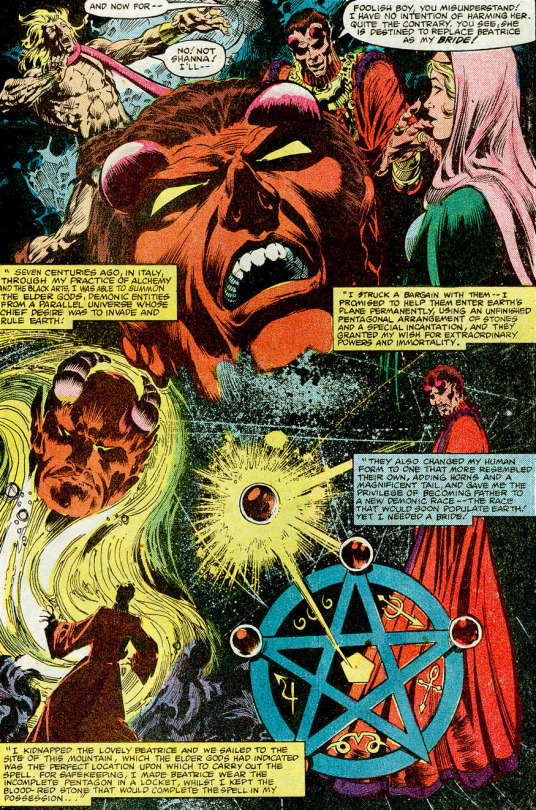
Belasco: They also changed my human form to one that more resembled their own, adding horns and a magnificent tail, and gave me the privilege of becoming father to a new demonic race – the race that would soon populate Earth! Yet I needed a bride! I kidnapped the lovely Beatrice and we sailed to the site of this mountain, which the Elder Gods had indicated was the perfect location upon which to carry out the spell. For safekeeping, I made Beatrice wear the incomplete pentagon in a locket…
Ka-Zar the Savage #12 by Bruce Jones & Brent Anderson
There’s also a connection made between the women he hypnotizes and assaults and his locket.
Which brings us to Magik and more specifically, Claremont’s mini-series about her time in Limbo.
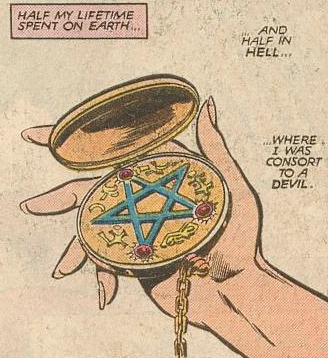
Half my lifetime spent on Earth… and half in Hell.. where I was consort to a devil.
Magik #1 by Chris Claremont & John Buscema
The language Claremont uses to talk about Magik and Belasco is uncomfortable, right from the start. Illyana describes herself as Belasco’s “consort.”
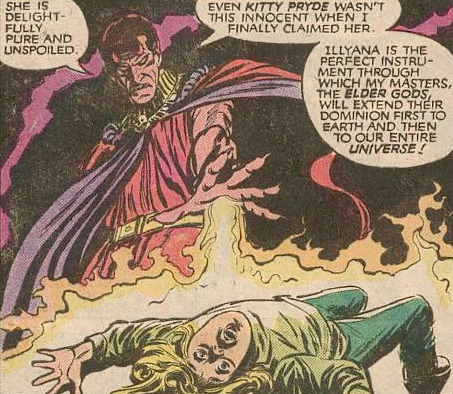
Belasco: She is delightfully pure and unspoiled. Even Kitty Pryde wasn’t this innocent when I finally claimed her.
Magik #1 by Chris Claremont & John Buscema
I’m going to go ahead and say this is creepy, especially when you compare it to how Belasco refers to her later in the story (as “flawed and corrupt”).
There’s a broader metaphor at work here, the loss of innocence. It doesn’t necessarily have to be about sexual abuse, but the way things are worded and framed, that connection is very, very easy to make.
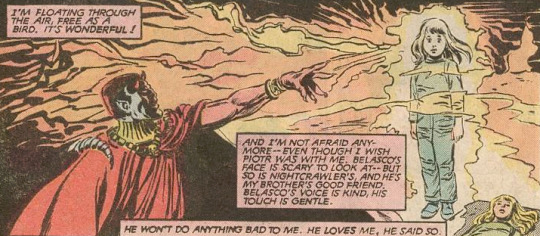
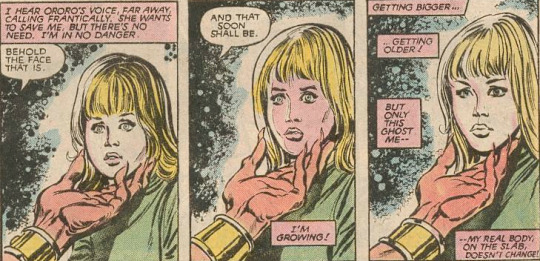
And I’m not afraid anymore […] Belasco’s voice is kind. His touch is gentle. He won’t do anything bad to me. He loves me. He said so. I hear Ororo’s voice. Far away, calling frantically. She wants to save me. But there’s no need. I’m in no danger. I’m growing! Getting bigger… getting older! But only this ghost me.
Magik #1 by Chris Claremont & John Buscema
Early on, Belasco corrupts a piece of Illyana’s soul, making it grow older and turn demonic. This is a smaller scale version of the overall story. Magik goes into Limbo as a small child and comes out as a 13-year-old, even though almost no time has passed on Earth. Her time with Belasco is something that makes her grow up too fast. It robs her of her childhood.
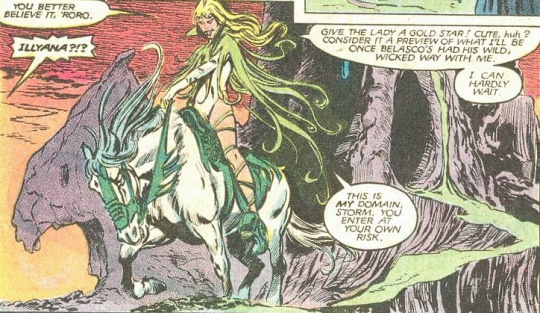
“Ghost” Illyana: Consider it a preview of what I’ll be once Belasco’s had his wild, wicked way with me.
Magik #1 by Chris Claremont & John Buscema
Again, the language here is unpleasant. Once you see it, you can’t unsee it. It’s on every page.
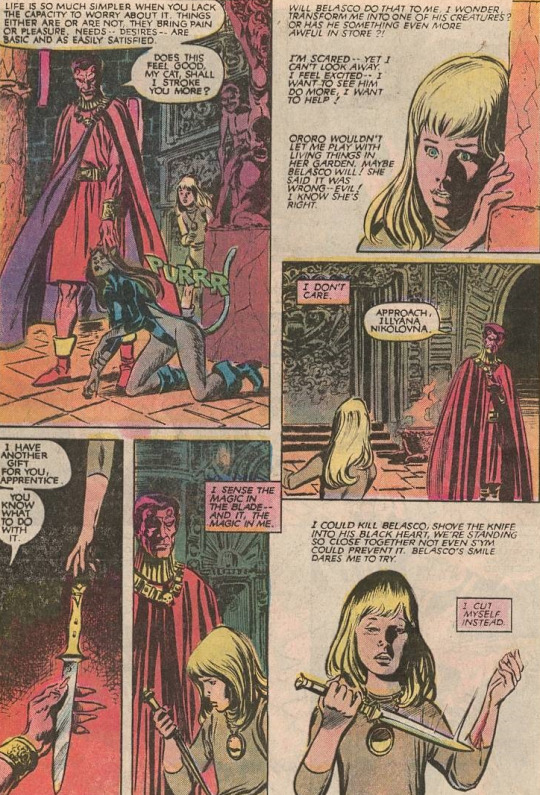
Belasco: Does this feel good, my Cat, shall I stroke you more?
Will Belasco do that to me, I wonder, transform me into one of his creatures? Or has he something even more awful in store?!
I’m scared – yet I can’t look away. I feel excited – I want to see him do more, I want to help!
Magik #2 by Chris Claremont & John Buscema
There’s a couple of things to single out here: the emphasis on touch (with Cat in this case, but there’s plenty of focus on Belasco touching Illyana too) and Magik’s mixed feelings about Belasco. She hates him and loves him and wants to please him and knows she should kill him. That bleeds into her feelings about herself. She’s consumed by guilt and shame. She doesn’t understand her own reactions. She feels rotten inside.
This is a common dynamic in abusive situations. Belasco has cut Illyana off from the rest of the world. She has every reason to hate him, but he’s her only possible source of love. Pleasing him is the only way she can get affection. Her sense of isolation continues even after she leaves Limbo. She finds it hard to connect with others after what she’s been through.
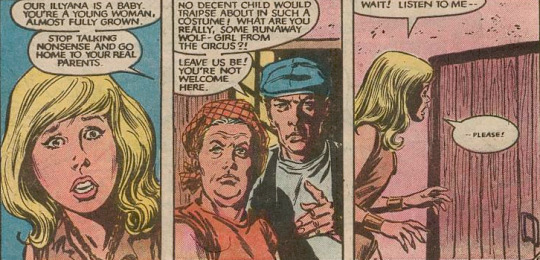
Nikolai Rasputin: Our Illyana is a baby. You’re a young woman, almost fully grown. […] No decent child would traipse about in such a costume! What are you really, some runaway wolf-girl from the circus?! Leave us be! You’re not welcome here.
Magik #4 by Chris Claremont & Sal Buscema
When she sees her parents again, they don’t recognize her. They shut her out. And they comment on the way she’s dressed.
Over the course of this book, her clothing becomes more sexualized. She’s only 13 when the series ends, and the last issue has her dressed in a bathing suit, ripped in true Savage Land style.
I’m not comfortable with the way the creators handle this. It helps to hammer home the metaphor, but it’s still bad. The thematic intention doesn’t erase the blatant sexualization of a child that’s happening here.
There are couple of things I do like about the ending, from a metaphorical/thematic standpoint:
1. When Illyana finally gets her mutant powers, they manifest as teleportation. The ability to escape. It’s a small detail, but very clever.
2. The soulsword. It’s one of the most interesting aspects of her character. She keeps trying to make an acorn, like the Limboverse Storm did. She wants to make something pure and good, but she can’t do it. So she gives up on trying to be “pure” and takes all of her pain and makes it into a weapon instead.
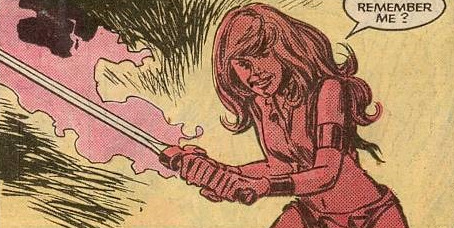
Illyana: Remember me?
Magik #4 by Chris Claremont & Sal Buscema
It’s the old Tumblr cliché: Damaged people are dangerous. They know they can survive.
Despite how uncomfortable this story is at points, I love it, especially the ending. It’s about reclaiming. Magik suffers, and then she turns her suffering into power. When we talk about characters being “powerful,” it’s almost always about their ability to kick other characters’ asses. But a fictional character’s only real power is in how they affect real people.
And for me, Magik is powerful.
I’m not trying to tell others how to feel about this series (and certainly, my own feelings are complicated), but as a trauma survivor, the soulsword always gets me. It’s hope. It’s looking forward, carving a new path that is informed by the past but able to look beyond it. That part is a metaphor for all kinds of trauma, not just sexual abuse.
144 notes
·
View notes
Text
Spookyfic Author’s Notes: Ghosts and Heroes and Metaphors
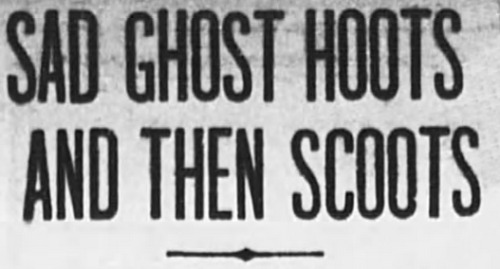
Via Yesterday’s Print
I said I’d do one of these every two chapters, didn’t I? Alas, Life Happened. The irregular schedule continues because this meta about The Ghost and its allegory got really long.
I said last time that the main catalysts for this fic were my brain melting post-semester and Night in the Woods. In the midst of all my NITW feelings, I considered the fact that Shirou would probably hate university. What do you even study, when your dream is To Be A Hero? I doubt the structure of academia would gel with him at all, much to his distress. Kid just wants to be functional, helpful, useful—nothing terrifies him more than the concept of him being useless, being a burden when he feels he owes the world so much. And isn’t a ghost story all about studying fear?
Another catalyst, which really helped to ground this fic when it was just a swirling cloud of “wouldn’t it be fun to write a murder mystery?” thoughts, was a paper I came across during the semester that melted my brain: Men, Movies and Monsters: Heroic Masculinity as a Crucible for Male Violence by Aaron Kipnis. I mentioned it in this post way back in April—as you can see it got into my head and got me thinking about a lot. It was an indispensable piece because it was one of the few I found in my wanderings through the subject of heroism and gender that said hey, listen, this idea that The Hero is always a manly man hurts men as much as it hurts women, though in ways we as a society don’t like to talk about. Kipnis suggests that chasing the ideal of The Hero—imposed by both modern action movies and ancient epic myths—has led generations of men to their deaths, whether in search of glory on a battlefield or as a result of self-harm.
If you can’t live up to the impossible ideal of The Hero, what do you fall back on? Well, you become a Monster of course. Kipnis observes that a lot of male-coded monsters, from vampires to the serial killers in thriller movies, have the same traits we celebrate in Heroes but warped and taken to their natural, nasty conclusion. This idea of The Hero and The Monster, two character types that stand in opposition to each other, being two sides of the same coin was fascinating and honestly kind of heartbreaking to me.
More realistically, though, if you can’t live up to the impossible ideal of The Hero, all you’re left with is a crippling feeling of inadequacy that society has in no way prepared men to deal with. A Hero is infallible, self-reliant, can take down entire armies singlehandedly, and certainly never falters or doubts himself—so in Kipnis’ own words, “Heroes can’t ask for help when they need it.” Someone who aspires to save the world surely has no need to save themselves.
And so we come to Shirou, a boy who Wants To Be A Hero and who has intense survivor’s guilt, trauma, and can’t stand to be a burden on anybody. I said the Most Shirou Line was that part where he says “I’m fine” and then faints, and I wasn’t kidding (there’s a part almost exactly like it in UBW, where he assures Saber he’s okay, and the next shot we see is him groaning and gritting his teeth in pain, hidden in his room)—this is a boy who bites down and buries everything for fear of being a nuisance, and defines his worth in the world by what he can do for other people. It’s a potent combination, and not a healthy one either—thus, the perfect aspect of his character to explore in a story, the most important thing to help him work through for writer and reader catharsis.
And so we come to The Ghost. Now, it is literally his ghost, but it’s also a neat bundle of metaphors for the emotional issues he refuses to acknowledge—like all problems, the ghost gets bigger when you push it away. The only way to “defeat” it is to face it head on, even if it’s scary, and accept that it’s part of you and try to find a way to move forward. He needs some help doing this, and that’s okay. I love that final scene in Part 6 a lot—after five long chapters refusing to cry, he finally lets it all out, lets himself feel those pesky and frightening negative feelings, lets himself say “it’s not okay”. And the people he love just hold and support him and accept him as he is.
Mental health is used as a horror device pretty often, and pretty often it gets exploitative—think every ghost story set in an “insane asylum” ever. I guess I wanted to look at that a little bit (though I’m no expert on the genre beyond what analysis I’ve read of these tropes and what bits and bobs I’ve picked up from pop culture osmosis). The horror element of this ghost story is the physical manifestation of Shirou’s trauma, which is intended to be acknowledgment that it’s natural to be scared of such things. Trauma is scary! Dealing with your issues is scary! The prospect of other people seeing how messy your head is is scary (Shirou is, after all, especially horrified that the ghost would try to hurt Sakura—i.e. he’s afraid that his own issues will hurt Sakura if she learns about them)! But in the end, I hope, the message is yes, these fears are justified, but you can’t keep avoiding these problems. Self-care is not hitting the physical manifestation of your PTSD repeatedly with a baseball bat in a Denny’s parking lot. Self-care is opening up to people you trust, gathering their support, and facing your problems so you can try to start to heal.
Just to show that you don’t have to get entangled in the supernatural to achieve this, we also have the parallel story of problem-facing and recovery with Sakura. The most blessed beautiful irony about these two is that they care so much for each other but routinely dismiss their own needs. I’m very fond of that “Even if you’ll never understand why, I love you” line because I feel like it sums up the way they look at each other: they see the imperfections, the broken bits, the self-esteem issues, and they accept them and try to help each other become better. Along the way, they learn to care for themselves little by little too (as we see in Sakura’s “can I say something selfish?” dialogue). It’s a relationship with mutual support and healing at its core, which is why it’s the emotional centre of this story.
It is, of course, a big ol’ canon parallel that Sakura sees Shirou’s ghost and says “well, that sure is a shadow monster messing up the town. But I still love you. Now let’s go fix this so we can go home and have a hot meal and try to get better.” Shirou needs a superhero of his own sometimes, too.
In the end, The Hero and The Monster are proved to be one and the same… but also, Shirou doesn’t have to be A Hero or A Monster and is allowed to just be Shirou, a sad and anxious young guy who wants to do good. The epilogue is still yet to come and wrap up these last emotional threads, but as of that climactic scene, he’s made the first scary and brave steps to trying to get better. He’s standing in ruins, after all, but they’re ruins overgrown with new greenery and new life.
20 notes
·
View notes
Text
seeing as how if anything presents the premise to me of: random people just suddenly have superpowers now (and that is sometimes used as allegory to tell a great sci fi story and commentary on society as well)
here is a non-exhaustive list of shows with those kind of premises:
1. Heroes (literally like Xmen if there was no rich ‘nice’ man to house them a la Professor Xavier, definitely fills the niche itch of born-superheroes and feeling like you don’t fit into the norm with science fiction undertones. This is the closest show you’ll get to nearly-exact-xmen-premise-and-execution. It truly feels like watching just more xmen, with no rich benefactors to help anyone.)
2. Misfits (like Xmen if it was just random delinquents, not big on the govt/societal element as much as using superpowers as a device to explore characters and their existing position in society, so more focused on individuals instead of wider systems)
3. The Umbrella Academy (like xmen in that the umbrella academy is the ones with powers who got adopted by a rich benefactor. As of all the other people born a certain day in certain circumstances, also likely with power - as of season 1 the show doesn’t cover them. Also like xmen, the premise is these people were simply born with powers. However, the umbrella academy seems to focus more on the very explicit themes of abuse and coping in adulthood with having gone through trauma. Those very present themes get a lot of attention, whereas any allegory about certain people being born different or not is not really used much to say anything in particular about society. Powers are mostly used the way they’re used in The Incredibles.)
4. Gifted (I haven’t watched it yet, but it’s literally an xmen television show right??? So I’m pretty sure it’s Exactly the Xmen premise).
------
Honorable mentions because the vibe of some people being singled out as different, used as allegory to tell similar stories to xmen:
1. In the Flesh (instead of an xmen superpower premise, certain individuals are Zombies. Does an interesting job of exploring societal issues through the allegory to deal with discrimination and political and religious systems interacting with it. Also does an interesting job of a truly realistic take of the zombie apocalypse - what happens after a zombie outbreak is contained? How does society adjust? Who gets treated as human, what makes different groups treat others as human or not? It has very grounded questions and looks into society at large. Of all the shows I’ve mentioned, In the Flesh may put the greatest weight on it’s allegory and themes of all of the shows mentioned. In the Flesh feels grounded, genuine, and can be painfully close to the issues it’s telling stories about. It also features canon mlm relationships, religious cults, government sanctioned discriminatory policies, ptsd and survivors guilt and other mental illness, death and war obviously - there are zombies.)
2. Merlin (instead of xmen superpower premise, certain individuals have Magic. There are strong professor x vibes that correlate to the character of Merlin and the choices he makes. Those grey area, sometimes blatantly bad decisions - like choosing to help people being hunted, then choosing to turn them over and possibly destroy lives because you have the safety of being able to pass and keep hiding. To me, his choices seem as sometimes too-acquiescing to a fucked society as Professor X’s choices sometimes seemed. Merlin is Not a paragon of actual justice. Likewise, Morgana in some ways plays a role similar to Magneto in some respects. The allegory for how society handles persecuting others, how that can be messed up, and how people within those societies submit or oppose those injust treatments, are all at play in the show. If you like some of the allegory in xmen, Merlin and In The Flesh as shows go after a lot of similar ideas in their bigger themes. On the surface Merlin is a fun romp in Camelot with magic and beasts and the legend of Arthur Pendragon told with younger people. The themes, and failures morally to some degree in most of the main cast, along with the ultimate failure and tragedy of things ending with the death of Arthur, give the story some depth that’s worthwhile when looking for more meaning.)
3. Humans (It ran on BBC America, also included the actor Colin Morgan. It follows the story of several androids, in a world with androids and humans. It explores what makes someone human, and the same xmen allegory kind of themes like discrimination and people separating each other by groups. So xmen allegory wise, it’s a great ride with a lot of interesting and worthwhile themes about humanity. As for xmen power premise - no, premise is androids instead. Like In The Flesh, Humans has a very grounded story that very much interweaves it’s themes both allegorical and literal, into all parts of it’s story.)
#xmen#x men#shows#i am a sucker for either the xmen power premise or the xmen story themes#so whenever anything has those premesis i jump into it
1 note
·
View note